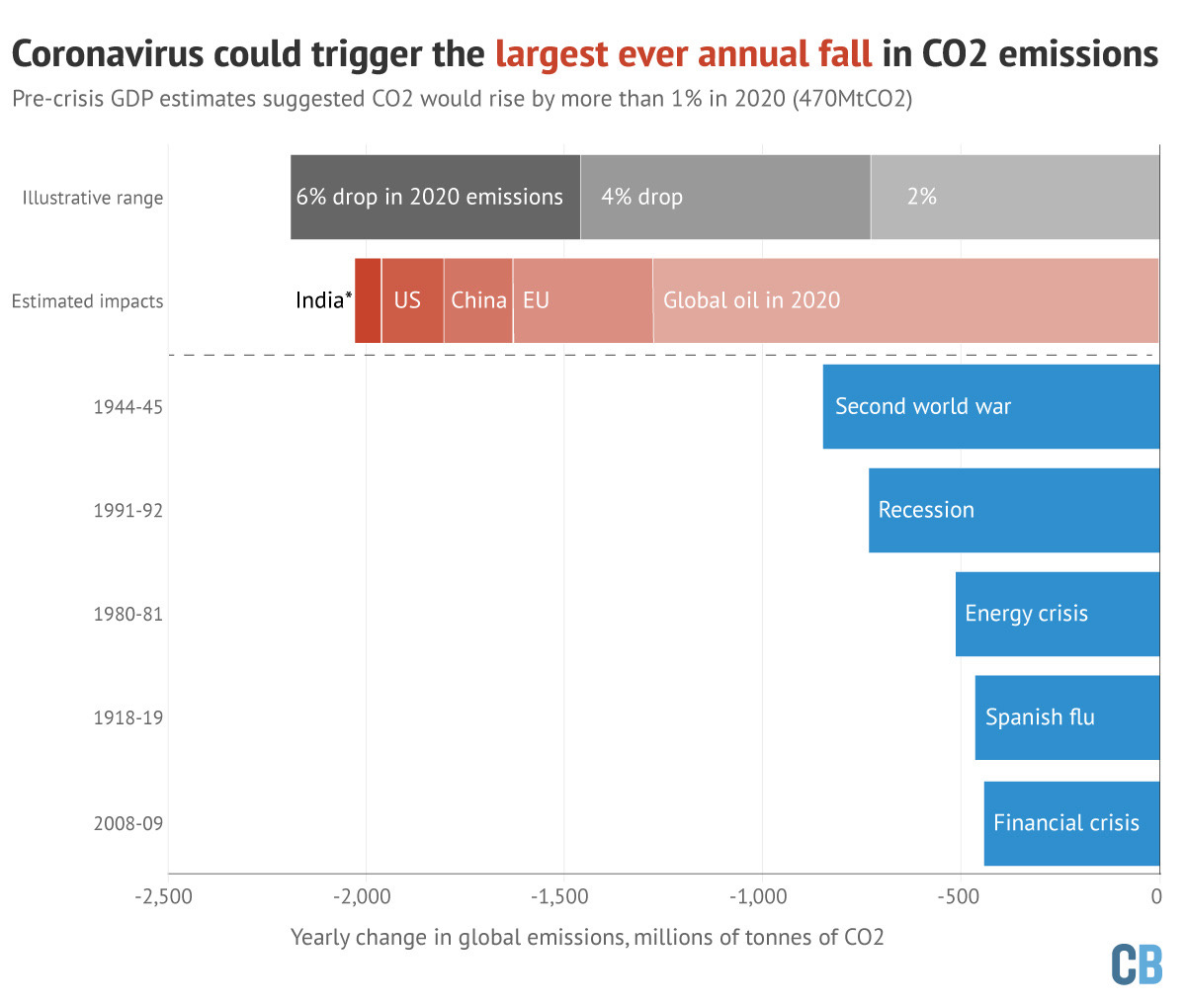On the 50th Anniversary of Earth Day: Lessons for the Climate Crisis from the Coronavirus
Published in Social Sciences

Authors:
Steve J. Bickley, Alison Macintyre, and Benno Torgler
School of Economics and Finance and Centre for Behavioural Economics, Society and Technology (BEST), Queensland University of Technology, Australia
Data show that due to drastically reduced travel and economic activity, CO2 emissions have decreased- possibly by as much as 5% this year[1] according to Rob Jackson, Professor of Earth Systems Science at Stanford. Many people are deriving solace from the fact that the earth is a beneficiary of this slowdown. Scientists are questioning whether it is possible to preserve any environmental benefits of this once-in-a-generation disruption (Abram 2020). One suggestion is to pressure governments and businesses into developing policies that support environmentally sound habits acquired during social isolation (e.g., remote working, less air travel, more video conferences). Another suggestion is to actively avoid creating expectations about a return to pre-coronavirus standards if, for example, governments bail out travel companies (Abram 2020). The starting point for such policies is to think about how to remove or reduce obstacles to working at home; for example, by investing in widely available, high-quality, public broadband, which necessitates bold infrastructure spending. The hope is that our current experience may change public perceptions towards the viability of shifting to low-carbon alternatives, similar to a Kuhnian paradigm shift (Abram 2020). Is now a good time to ban the burning of unseasoned wood or the burning of carbon fuel? Can we move away from using carbon compounds as fuels, or talk about nuclear energy produced in efficient and well-engineered power stations until we harvest solar energy efficiently or find out how to use nuclear fusion energy (Lovelock 2019)? What about investing the trillions of stimulus dollars into renewable energy (for example, it would cost $4.5 trillion to transform the entire US economy to carbon zero[2])? Economic principles tell us that government debt is not necessarily a bad thing if spent on projects that increase the productive capacity of the economy for decades into the future.

Source: https://www.carbonbrief.org/an...
A discussion of alternatives needs to be linked not only to science of the topics, but also to the science of changing minds (Gardner 2006) or habit formation. Tackling the climate crisis requires substantial disruptions to our lifestyles, a prospect that has not been greeted with enthusiasm. Immediate danger requires an urgent response. Indifference to the climate crisis, on the other hand, has limited immediate implications. It is hard to directly ascribe a specific event to climate change (Comerford 2020), a problem for our ingrained linear cause and effect logic. The phenomenon of changing minds remains one of social sciences’ least understood human experiences and research areas. It raises the question: are current scientific insights enough to understand whether the COVID-19 crisis can radically change our viewpoints, expectations, or incentive structures?
Behaviouralists note that scientific evidence regarding climate change has been communicated gradually, evoking less dramatic reactions (Comerford 2020). For some behaviouralists such as Comerford (2020), communication appears to be key. Other environmental economists have emphasized the need to consider the incentive structures of all decision makers – particularly those who would lose with behavioural adjustments. An actual status quo equilibrium largely reflects the balance of political forces and institutions that stay at this position until they are actually “shocked” to a new equilibrium (Bird et al. 2006). Thus, suggestions such as “creating intuitive mental models and apt metaphors to explain the link between our consumer behaviour carbon emission and a changing climate” (Comerford 2020) may not be enough.
To change behaviour we have to want it, value it, and possibly be prepared to give up some conveniences. The level of compliance with stay at home orders is both surprising and not. It is revealing that we do not want to harm our neighbours or ourselves. We do not want to overwhelm the health care system. Maybe the experience of the crisis will help us conceive of the earth more like a health care system for all life on the planet, not just a cookie jar for selfish exploitation by whoever got there first. Consumers have the power to shift the behaviour of suppliers through consumption choices and petitioning for change, but their interests are heterogeneous and not well-organized. In addition, a consumer is often also a producer. As Goffman (1959) powerfully demonstrated, we simultaneously play various roles in our daily lives.
Mapping what happened during COVID-19 can provide some insights about hope for global cooperation on climate change. Are countries with better responses to COVID-19 also better global citizens? Or has that been a matter of looking out for their own people? Mapping can also help to understand innovative responses at the business level. For example, which private companies have retooled and re-configured their production strategies? What are the characteristics of such companies (e.g., size, industry, goals)? What can we learn from what we call “superexternalities”, while also taking into account that the coronavirus crisis has raised our awareness of our super-interconnectivity? The actions that I take today will affect the people around me, most of whom I will never meet, nor will I know they exist or whether my actions have affected them. Going to the store when symptomatic or asymptomatic could be a death sentence to the nice lady behind me in the queue, the checkout operator, or perhaps their elderly relatives. Just as the toilet waste does not just go “away” when we flush it, spreading an extremely contagious, untreatable virus in a highly interconnected ecosystem has consequences beyond the individual self. Experiencing such a connected crisis may help us determine whether we have the political and technological tools to deal with the more conceptually challenging climate crisis, while also acting as a trial run of our psychological capacities for adaptation. We have seen that we can modify tools and adjust to unfamiliar activities and ways of life.
If this is all too complex, we should seriously consider Morton (2018), who offers a shortcut to ease our psychological pressures: “[L]ike Nietzsche proclaiming that God is dead, maybe we should boldly proclaim that the world is dead. Now that there is a bewildering variety of scales on which to think and act - ecosystem scale, planet scale, biosphere scale, human scale, blue whale scale…- it’s already the end of the ‘world'. This is actually a relief. It means we don’t have to hold on to a fantasy for dear life, the fantasy of anthropocentrism, which is inaccurate and violent. It’s like those horror movies in which the hero finds out that she or he is already dead. If you’re already dead, there’s nothing to be afraid of, is there?” (p. 155). The coronavirus crisis has shown us that we are “a symbiotic being entangled with other symbiotic beings” (p. 157). Thus, as Morton points out, the “problem with ecological awareness and action isn’t that it’s horribly difficult. It’s that it’s too easy” (p. 157). The coronavirus crisis and its lessons of symbiotic interconnectedness offer a fast-track to what was already easy, it’s letting go of the Anthropocene that’s hard. Happy Earth Day.
References
Abram, Simone (2020). Coronavirus: world’s response has slashed CO₂ emissions – here’s how to keep them down, The Conversation, March 19.
Bird, Richard, Jorge Martinez-Vazquez and Benno Torgler (2006). Societal Institutions and Tax Effort in Developing Countries, in: James Alm, Jorge Martinez-Vazquez and Mark Rider (eds.), The Challenges of Tax Reform in the Global Economy. New York: Springer, pp. 283-338.
Comerford, David (2020).Coronavirus should give us hope that we are able to tackle the climate crisis, The Conversation, March 9.
Gardner, Howard (2006). Changing Minds: The Art and Science of Changing Our Own and Other People’s Minds. Harvard Business School Press.
Goffman, E. (1959). The presentation of self in everyday life. Anchor Book.
Lovelock, James (2019). Novacene: The Coming Age of Hyperintelligence. Penguin Books.
Morton, Timothy (2018). Being Ecological. MIT Press.
[1] https://www.reuters.com/articl...
[2] https://www.woodmac.com/news/feature/deep-decarbonisation-the-multi-trillion-dollar-question/





Please sign in or register for FREE
If you are a registered user on Research Communities by Springer Nature, please sign in